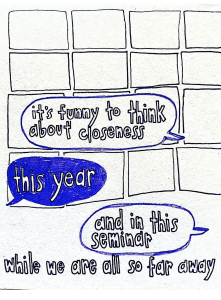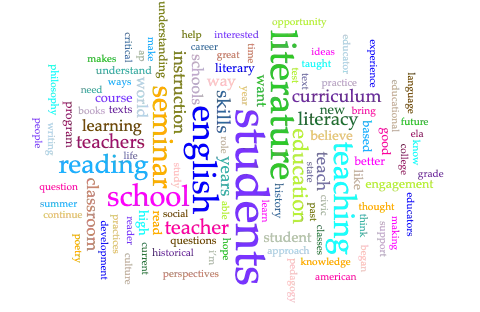
Image courtesy of Hannah Edber from her NEH Making the Good Reader and Citizen final project “Getting Closer”
Being a master’s student during the pandemic has proven to be more difficult than I could have anticipated but not for the reasons that you may imagine. Not having had a single semester of my master’s in person made me yearn for the many semesters of my undergrad nestled in the Humanities Atrium, the North Reading Room, or any quiet hallway, classroom, or lounge that offered me a sense of community and belonging amongst my fellow peers. After reflecting on my undergraduate career in the English department, I realized that most of it was spent in the closely knit community fostered by the English Honors Program. After the past four years at Stony Brook, the English Department has become my second home.
When I began my master’s in the BA/MA program last fall, I discovered that an online graduate program provided me with even more solitude than I expected. My sense of isolation intensified when I graduated with my bachelor’s last fall and began my work solely in the graduate program; not being able to interact with my classmates in person made me nostalgic for the sense of belonging I felt when I was President of Alpha Nu Zeta English Honor Society and participated in the English Honors Program in my bachelor’s. In desperation to find this feeling once again, I emailed Theresa Spadola.
Throughout my undergraduate and graduate careers at Stony Brook University, I have paved my way to belonging through dedicating myself to service. I realized that much of what I was missing in my master’s program was involvement and leadership in the department. Theresa briefly mentioned that there was an internship available with Andrew Newman, and I jumped at the opportunity to work with him.

Word cloud from the personal statements of the participants in “Making the Good Reader and Citizen.”
Andrew Newman Co-Directed a National Endowment for the Humanities (NEH) Summer Seminar for school teachers entitled “Making the Good Reader and Citizen: The History of Literature Instruction in American Schools.” My initial work for the seminar was mainly clerical insofar as it required me to collect applications for participants, contact applicants and organize the Google Drive. Although this work seemed important, I was hoping to do more with this internship.
When the seminar actually began, my concerns were allayed as I got what I was hoping for and much more. Sitting in with all of the teachers chosen to participate, I realized what I was a part of was not just an internship, but a life experience that would alter my viewpoint on teaching. Throughout the seminar, participants reflected on and discussed what they believed to be mistakes they made while teaching and what they learned from teaching in schools across the country– and in one case, even the world. Topics such as race were spoken about at length, opening my eyes to the ways that racism infiltrates the backbone of many students’ education, and alternatives to present-day teaching methodologies were presented in an attempt to remedy this and many other important issues. Probably one of the most important discussions that helped to transform own understanding of teaching was led by Deirdre Faughey, in which she taught us the benefits of educating through drawing; to many of us who have taken Professor Patricia Dunn’s classes this concept is familiar, yet Deirdre’s discussion reached farther than the act of drawing itself, instead it demonstrated how alternative and personalized modes of teaching to benefit students can allow for mutual respect and care in the classroom. This idea will surely follow me when I become an educator.
Towards the very end of the seminar, participants were asked to work collaboratively to create an artifact named the “Good Manifesto” in which they worked with their peers in order to create a document that lists their beliefs regarding teaching and how they plan to ensure these beliefs translate into the classroom. In this manifesto, the term “community” comes up six times. Considering the understanding of community that I gleaned from my time as an undergraduate at Stony Brook, this was not surprising. Community has been integral to my success as a student. Probably the most significant of these statements in the manifesto is that “Neither reading nor the reading classroom take place in a vacuum. Students read in the context of the world around them. Students should be invited and encouraged to bring all of who they are to this context” and so the participants plan to “foster a sense of community that values individual thought and contribution. [They] aim to provide real life experiences in order to equip students with the skills to discern their own values and their vision for society.” Here, my yearning for community that led me to this internship became validated. Community means valuing what we bring to the table, and sharing that in a broader context with those around us. Part of my fostering of community is sharing what I learned in this internship with you right now.
The internship’s multifaceted nature gave me the opportunity to work on clerical items and learn new programs, such as Padlet and Qualtrics, while also being able to listen and participate in a productive, transformative and meaningful seminar with teachers from very different backgrounds. The seminar celebrated diversity and participants embraced this in order to imagine alternatives to the present day teaching methodologies that marginalize groups of students based, for example, their race and gender.
As a future educator, listening to the mistakes and reflections of others in the field gave me unparalleled knowledge and experience that I would have likely been unable to gain elsewhere unless it was me making those mistakes at the outset of my teaching in just a few years. I was able to learn from their mistakes and make a plan for teaching with open mindedness and respect at the forefront of my mind.
![Handwriting: "My students will be going back to in person school full time in two weeks: What will that be like, for any of us?" In box: "What kind of "physical and social isolation" have my students experienced through their schooling over thius past year and a half... and how can literary practices resore the social, academic and spiritual selves of students who have long been in some kinds of isolation? [arrow] following Deirdre Faughey's study on visual methods (2020). Drawing of headphones "And how can I learn to listen how can we all?"](https://you.stonybrook.edu/eglblog/files/2021/09/Screen-Shot-2021-09-12-at-2.29.21-PM-231x300.png)
mage courtesy of Hannah Edber from her NEH Making the Good Reader and Citizen final project “Getting Closer”
Thank you to Drew Newman for giving me this amazing opportunity to work with brilliant minds this summer and for challenging me to try and experience new things through this internship. Thank you to Hannah Edber for graciously allowing me to incorporate some of her work from the seminar into this blog post. Her images helped me to contextualize the feelings of isolation I have experienced due to the pandemic and how I plan to recreate safety in the classroom when safety has taken on new meanings for us all. Thank you to Theresa Spadola for always pushing me to be my best self and for guiding me to this opportunity.

I am very happy to see your article, I very much like and agree with your point of view. Thank you for sharing. This is really a very useful information in my life. I will share it with my friends
subway surfers
thank you for that
شركة فحص فلل بالرياض
Your internship experience during the Pandemic was very good and worth learning. I have learned a lot from your post.
infected days
Great article, thank you so much!
최고의 메이져 먹튀검증 이곳에서 즐기세요
검증된 업체 먹튀검증 최고의 메이져
여기가바로 먹튀검증 배팅의성지